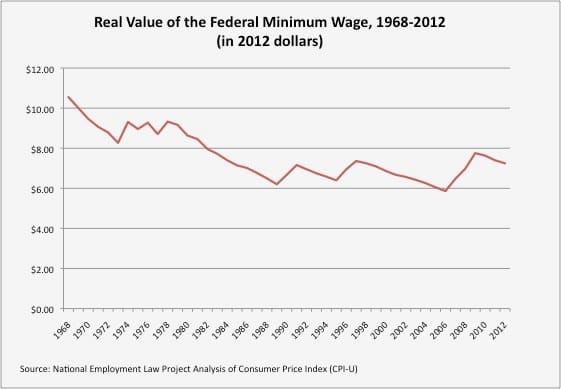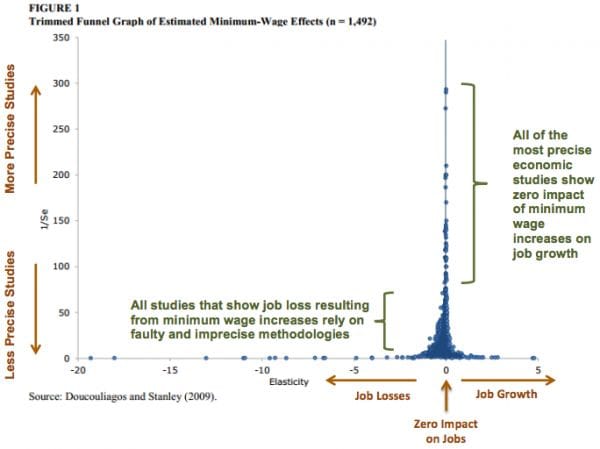Why We Should Raise the National Minimum Wage

Obama's 2013 State of the Union addressed a lurking issue in today's post-recession America: raising the minimum wage to $10.10 by 2015. This sentiment is echoed by 73 percent of the electorate.
The Fair Minimum Wage Act of 2013 seeks to account for Congress' failure to raise the minimum wage in accordance with inflation and the heightened cost of living over the past decades.

The bill was introduced by Senator Tom Harkin (D-IA), chair of the Senate Health, Education, Labor and Pensions Committee, and Representative George Miller (D-CA), and has spurred support from other representatives as well.
Raising the minimum wage has a bipartisan appeal to it, as the new deal would benefit mostly middle-class workers and has an almost universal tone of common sense: to pull people out of poverty, we should pay them more and give more value to their work.
Here are some advantages to raising the national minimum wage:
It would make life easier for 30 million Americans
Raisetheminimumwage.com states that under the new act, more than 30 million Americans would receive a raise. 43 percent of these workers have some college education and could use the extra money to pay loans off faster.
The raise would also benefit 17 million children whose parents work for minimum wage. Perhaps most significantly, the raise could usher in a new era of women's equality of pay as 71 percent of these workers are women working in jobs that rely on tips.
Minimum wage increases do not reduce employment
The topic of wage increases in relation to employment statistics has been one of the most contentious and debated issues in economics for years. The Center for Economic and Policy Research (CEPR) conducted an analysis this year that concluded that there is no effect on employment from raising the minimum wage.
This comes from meta-studies (studies of studies) pertaining to 64 studies of the effects the minimum wage has on employment. To put it briefly, these meta-studies that showed a correlation between wage increase and job loss were "less precise" than studies that show little to no correlation:
“Two scenarios are consistent with this empirical research record. First, minimum wages may simply have no effect on employment... Second, minimum-wage effects might exist, but they may be too difficult to detect and/or are very small.”
Below is a graph charting the many studies that were deemed to be insufficient in their preciseness crowded at the bottom of the uncertainty axis. If anything, it shows that one should not always believe what is read, even if the document itself is peer-reviewed.

Wage increases would increase consumer confidence and generate more economic activity
The National Employment Law Project (NELP) provided statistics that should ease the trepidation held by opponents of the bill:
- Consumer spending accounts for 70 percent of U.S. economic activity but remains tepid because consumers just don’t have the money to spend. Wages and salaries now make up the lowest share of national income since 1966, while corporate profits are now the largest share of national income since 1950.
- Raising the minimum wage boosts consumer demand, as low-income workers spend their higher wages at local businesses.
- The Fair Minimum Wage Act of 2013 would generate more than $32 billion in new economic activity, translating to 140,000 new full-time jobs as higher sales lead businesses to hire more employees, according to estimates by the Economic Policy Institute.



